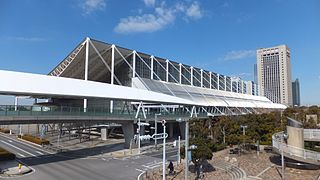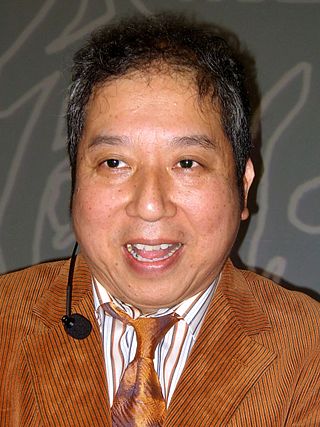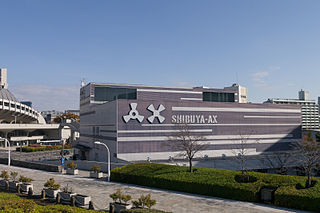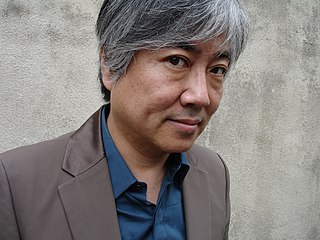Related Research Articles

PE'Z was a Japanese jazz instrumental band consisting of five men, dubbed "The Samurai Jazz Band." They were signed onto Sony Music Japan from 2008 until their split in 2015.

Shibuya-kei is a microgenre of pop music or a general aesthetic that flourished in Japan in the mid-to-late 1990s. The music genre is distinguished by a "cut-and-paste" approach that was inspired by the kitsch, fusion, and artifice from certain music styles of the past. The most common reference points were 1960s culture and Western pop music, especially the work of Burt Bacharach, Brian Wilson, Phil Spector, and Serge Gainsbourg.
Hello! Project is a Japanese musical collective consisting of all female recording artists and groups under Up-Front Promotion, a subsidiary of Up-Front Group. The name was initially used as Michiyo Heike and Morning Musume's fan club name in 1999, but has since then been used to represent all female recording artists at Up-Front Promotion. Until 2014, their songs were primarily produced by Tsunku.

Makuhari Messe (幕張メッセ) is a Japanese convention center outside Tokyo, located in the Mihama-ku ward of Chiba City, in the northwest corner of Chiba Prefecture. Designed by Fumihiko Maki, it is accessible by Tokyo's commuter rail system. Makuhari is the name of the area, and Messe is a German language word meaning "trade fair".

Minoru Mukaiya is a Japanese musician best known as the former keyboardist of the jazz fusion band Casiopea and producer of the Train Simulator series of Japanese video games.

Fuse or Fuse Festival, formerly Music Business Adelaide and Eat the Street, was an Australian contemporary music event held annually in the South Australian capital of Adelaide, from 1996 until 2012 or 2013. It showcased Australian musicians covering a wide range of genres in venues in the West End of Adelaide to industry professionals and fans, growing to three days in November 2003.

The Great Escape Festival is a four-day music festival held in Brighton and Hove, England every year in May. It is operated by MAMA Festivals and showcases new music from a variety of genres. The festival was founded in 2006 and roughly hosts 500 bands across 30 venues throughout the city. It has been likened to South by Southwest.

Shibuya-AX was a concert hall in Shibuya, Tokyo, Japan, near the Yoyogi National Gymnasium.
Boom Pam is a Middle Eastern rock band from Tel Aviv, Israel.

Nick Bax is a British designer and academic whose creative practice has spanned the fields of graphics, creative direction and art.

Yasuaki Shimizu is a Japanese composer, saxophonist and producer. He is known for his interpretations of the music of J.S. Bach, in particular the "Cello Suites 1-6" re-arranged for and performed on tenor saxophone.

Vivid was a five-member Japanese visual kei rock band from Tokyo. The band was formed in March 2009 and is currently signed with Sony Music Japan's Epic Records Japan label. Vivid had announced on Jan 28, 2015, that they will be disbanding after the last stop of their final tour in April.

Man with a Mission is a Japanese rock band which was formed in Shibuya, Tokyo, Japan, in 2010. The band currently consists of five band members, with stage names of Tokyo Tanaka, Jean-Ken Johnny, Kamikaze Boy, DJ Santa Monica and Spear Rib (drums). Their distinguishing feature is that all of the members wear differently designed wolf masks during both their concerts and their music videos. Many of their singles have been used as theme songs for a variety of anime, live-action movies, and video games.

Kev Gray & The Gravy Train are an alternative pop rock band formed in Tokyo in November 2008, with members from America, Canada, England and Japan. After being chosen as a feature band in the government-sponsored, UK-Japan Year 2008, the group achieved mixed success on the Japanese music scene, after signing to Hemlock Music and twice winning the national music award, Gaijin Sounds.
Kansai Music Conference (KMC), is an international music industry conference based in the city of Osaka, located next to Kobe and Kyoto in the Kansai region of Japan, approx. 600 km west of Tokyo. Established in November 2008 by music industry executive Duane Levi, the conference is an annual event focused on the continual theme of “Building Bridges With Music” to create a global community of artists, industry and music fans for the purpose of promoting cultural exchange through music, artistic collaboration, and cultural awareness.
A radius clause is a form of non-compete clause used in the live music industry, in which a tour promoter stipulates that a performer, for a certain length of time prior to or following an appearance at a concert or festival, must not hold concerts at other locations within a certain radius of the city where they are to perform. In essence, it gives the promoter a form of territorial exclusivity, ensuring that the performer does not book concerts with competing promoters and venues in nearby areas, which can undermine ticket sales for their main event.

Korea Spotlight, originally named K-Pop Night Out at SXSW (KPNO), is an annual concert of South Korean artists held in the United States, organized by Korea Creative Content Agency (KOCCA). It started in 2013, and is a music showcase of the annual SXSW music festival in Austin, Texas.
UK Project is a Japanese independent record label and an artist management company which runs various music labels, artist management agencies and concert venues under its umbrella company.

Japan Nite is an annual music event in North America which began in 1996, featuring Japanese rock, pop, and alternative music artists. Originally centered around South by Southwest in Austin, Texas, the event expanded in later years to include multi-city tours of the United States, and has often been the first US performance for the participating artists.

Focus Wales is an international multi-venue showcase music and arts festival held annually in Wrexham, Wales. It is Wales' biggest music industry event and was first held in 2011. The event showcases emerging Welsh musical talent, as well as a selection of international emerging acts, film screenings, and conference events.
References
- 1 2 http://search.japantimes.co.jp/cgi-bin/fm20101105a1.html , The Japan Times
- ↑ "Shibuya O-East/".
- 1 2 "Kansai Music Conference & Japan Music Week". 10 September 2009.
- 1 2 "Japan Music Week International Artists - JMW 2011 Music Convention & Festival International Artist Applications". Archived from the original on 2011-09-05. Retrieved 2011-10-11.
- ↑ http://search.japantimes.co.jp/cgi-bin/fm20101105a1.html The Japan Times
- ↑ "Home". japanmusicweek.com.